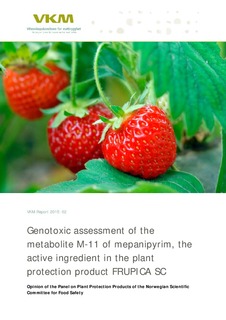Genotoxic assessment of the metabolite M-11 of mepanipyrim, the active ingredient in the plant protection product FRUPICA SC. Opinion of the Panel on Plant Protection Products of the Norwegian Scientific Committee for Food Safety
Dirven, Hubert; Lyche, Jan Ludvig; Låg, Marit; Nilsen, Asbjørn Magne; Borgå, Katrine; Eklo, Ole Martin; Grung, Merete; Sverdrup, Line Emilie; Källqvist, Torsten
Research report
Published version
Permanent lenke
http://hdl.handle.net/11250/2463633Utgivelsesdato
2015Metadata
Vis full innførselSamlinger
Sammendrag
The VKM Panel for plant protection products considered Frupica SC in a meeting on 25.11.2010, and found the active ingredient problematic with regard to carcinogenic effects and possible genotoxicity. M11 is a metabolite of mepanipyrim which is the active ingredient the plant protection product Frupica SC. The Norwegian Food Safety Authority has asked the applicant for further assessment of the genotoxic potential of the metabolite M11. The applicant has submitted a rat liver in vivo Comet assay of the metabolite, and the panel has been requested to consider if the genotoxic properties of mepanipyrim and the metabolite M11 is adequately documented.The metabolite M11 caused positive findings in in vitro studies for bacterial mutation and chromosomal aberrations. Three in vivo studies (Micronucleus, unscheduled DNA synthesis and Comet assay) did not show evidence of genotoxicity. Based on the documentation available, VKMs Panel on Plant Protection Products concludes that mepanipyrim and the metabolite M11 should not be considered genotoxic in vivo. The lack of demonstrated in vivo genotoxicity makes it likely that mepanipyrim induces liver tumors in rats and mice by a mechanism that involves a threshold below which tumors are not expected to develop. This conclusion is strengthened by the finding of a promoter-like behavior of mepanipyrim for induction of gamma-glutamyl-transpeptidase positive foci in rat liver.
